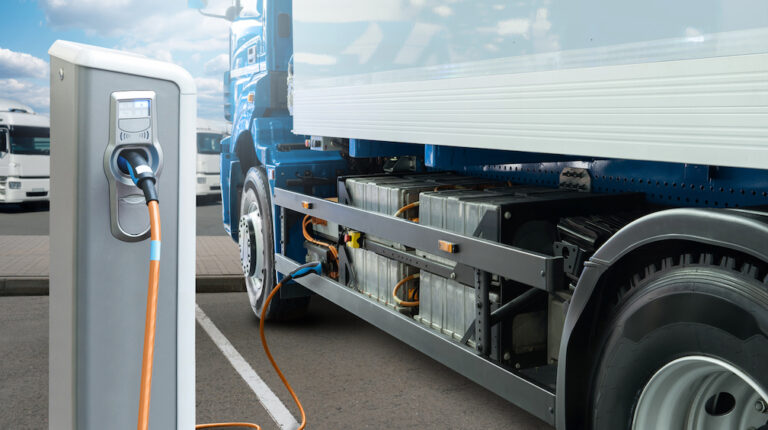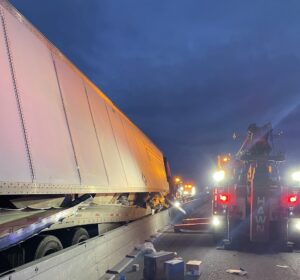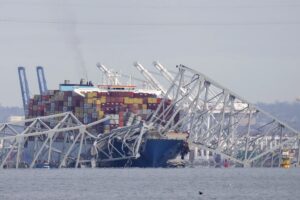NEW YORK — With 11 states joining California in adopting the Advanced Clean Truck (ACT) rule by 2027 including New York, last week the Trucking Association of New York held an online meeting for the sole purpose of calling for an immediate delay to the regulation. The Advanced Clean Truck rule which is a rule that association president Kendra Hems said held “severe consequences” for the trucking industry and all the businesses and residents who rely on it.
The regulation began in California and has been given ownership to most entities that refer to it. California implemented the regulation this year.
The rule was approved by the California Air Resources Board (CARB) in March 2021 that requires medium and heavy-duty vehicle manufacturers to sell zero-emission vehicles (ZEVs) as an increasing percentage of their annual sales in the state from 2024 to 2035, ultimately transitioning to only ZEV sales in California by 2036.
“We stand in support of creating jobs, supporting the economy, driving safety, and delivering a sustainable future for our members,” Hems said. “Unfortunately, this regulation could threaten our progress that we’ve been making as it relates to environmental initiatives.”
While voicing staunch opposition to the ACT rule, Hems said her organization supports the transition to zero emission vehicles.
“As an industry, we have worked closely with our governmental partners for many years to reduce the emissions from heavy duty trucks,” Hems said. “And as a result, the industry has seen tremendous achievements reducing pollutants by nearly 99%. In fact, it would take 60 of today’s trucks to generate the same level of NOx and soot emissions coming from a single truck in 1988.
Hems also pointed out was that “trucking has virtually phased out harmful sulfur in the diesel fuel, practically eliminating sulfur oxide emissions, and significantly reduced fine particulate matter from trucks, improving the air quality, wellbeing, and livability of our communities. This success has come from working together, not by adopting overly aggressive mandates that create significant economic burdens and ignore the challenges that still face the industry as it moves toward the use of zero-emission vehicles. The advanced clean truck regulation requires manufacturers to sell a percentage of their total sales in New York State as zero-emission vehicles starting in 2025, with increasing percentages through 2035.”
“In order to meet the percentage requirements, the sales of internal combustion vehicles will be reduced,” she said. “So to put this in perspective, on average there are 4,000 class eight trucks registered annually in the state of New York.”
Starting in 2025, 7% of those trucks will need to be zero emission. That equates to 280 zero emission trucks in order to support the total number of trucks sold each year. To date less than 40 class 7 or 8, zero-emission trucks have been registered in the state of New York.
“There are significant barriers in New York that make it nearly impossible to operate these vehicles,” Hems said. “Two of the most significant are the lack of charging infrastructure. We do not have infrastructure in the state of New York to support the use of these vehicles. The average range of use on a heavy duty electric truck is about 280 miles. And since the rule was adopted in 2021, New York has not installed a single publicly available heavy duty charger.”
Hems pointed out that the state of New York is no further ahead in building out charging infrastructure than four years ago when the rule was adopted.
Cost prohibition comparing a new clean diesel commercial truck which is between $180,000 and $200,000 opposed to the price of an electric truck is nearly $500,000.
“So just these two challenges alone between the lack of infrastructure and the cost of the equipment, we know that our, our trucking companies will not buy or invest their money in these trucks that they cannot use,” Hems said.
According to the ACT Regulation factsheet, the rule mandates the above ZEV sales percentages for all vehicle manufacturers that sell 500 or more vehicles per year in California. The ACT Regulation, which requires vehicle manufacturers to report the number of vehicles they sell within California each year, is structured as a credit and deficit accounting system. A manufacturer accrues deficits based on the total volume of on-road heavy-duty vehicle sales within California beginning with model year 2024 vehicles. These deficits must then be offset with credits generated by the sale of ZEVs or near-zero emission vehicles
“This policy places a mandate on our truck dealers in New York to try and sell vehicles to an industry that currently has very limited applications for their use, making it impossible to meet the goals of the regulation,” Hems said. “It’s not that they don’t want to comply, they simply can’t comply. It’s not good policy, quite frankly, it’s irresponsible and it will only serve to hurt our businesses in New York.”
States implementing ACT rule
- California – 2024
- Massachusetts – 2025
- New Jersey – 2025
- New York – 2025
- Oregon – 2025
- Washington – 2025
- Vermont – 2026
- Colorado – 2027
- Connecticut, New Mexico, Rhode Island and Maryland – 2027 (Draft rule language released)
Chuck Burr of Burr Truck backed Thompson, citing his company’s challenges of compliance with the rule.
“Over the past two years, our company has taken pride in being a pioneer in the new world of electric trucking,” Burr said citing the implementation of the first Level 3 120- kilowatt DC fast charging station to Broome County.
“We even made it publicly accessible due to a shortage of charging stations locally,” Burr said. “We’re proud to have sold one of New York state’s 31 class eight battery electric vehicles that are in operation today. We’ve also signed on as a workhorse electric vehicle dealer, and we are the first certified Isuzu Electric vehicle dealer in the Northeast. We’ve invested heavily in training and tooling to make this new era of trucking available to our customers. Our commitment hasn’t changed. We are aligned with the New York State goals to achieve zero emissions by 2040, but for the first time in my 31 career, I’m questioning if our company will survive the rules in place starting January 1st and be here to see the path to 2040 unfold.”
Bruce Guthrie is an award-winning journalist who has lived in three states including Arkansas, Missouri and Georgia. During his nearly 20-year career, Bruce has served as managing editor and sports editor for numerous publications. He and his wife, Dana, who is also a journalist, are based in Carrollton, Georgia.















Since when did New Yorkers sacrifice their autonomy to blindly follow the lead of California’s CARB board? I don’t understand how NY can adopt these policies when the people of NY did not vote for them